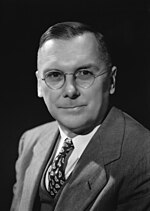Hugh Latimer Dryden
| Hugh Dryden | |
|---|---|

Hugh Dryden
|
|
| Born | July 2, 1898 Pocomoke City, Maryland |
| Died | December 2, 1965 (aged 67) Washington, D.C. |
| Fields | Aeronautics |
| Alma mater | Johns Hopkins University |
| Known for | NASA |
| Influenced | Paul C. Donnelly |
| Notable awards |
Daniel Guggenheim Medal (1950) Wright Brothers Memorial Trophy (1955) Elliott Cresson Medal (1960) John Fritz Medal (1963) |
Hugh Latimer Dryden (July 2, 1898 – December 2, 1965) was an American aeronautical scientist and civil servant. He served as NASA Deputy Administrator from August 19, 1958 until his death.
Dryden was born in Pocomoke City, Maryland, the son of Samuel Isaac and Nova Hill Culver Dryden, and was named after a popular local Methodist clergyman. During the financial panic of 1907, his father lost his job and the family moved to Baltimore, Maryland.
As a student, Dryden excelled in mathematics. He graduated from Baltimore City College, a high school, at the age of 14, and was the youngest student ever to graduate from that school. He was awarded the Peabody Prize for excellence in mathematics. With a scholarship, he was admitted to Johns Hopkins University and graduated with honors after only three years. He earned a M.S. in physics in 1916. His thesis was titled, "Airplanes: An Introduction to the Physical Principles Embodied in their Use."
In 1918, Dryden joined the National Bureau of Standards, becoming an inspector of gauges. With the help and influence of Dr. Joseph S. Ames, he obtained a transfer to the bureau's Wind Tunnel division, and began taking graduate courses in fluid dynamics to complete his Ph.D. In 1919 at the age of 20, he was awarded his degree in physics and mathematics from Johns Hopkins University, the youngest person ever to have received a doctorate from that institution. His thesis was on the "Air Forces on Circular Cylinders".
...
Wikipedia
